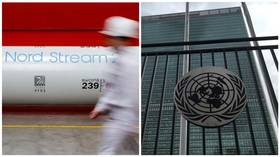Lukashenko's offer to change Belarus' constitution likely an attempt to buy time as opposition lacks mechanism to remove him
If Belarus' opposition succeeds in removing Alexander Lukashenko from the presidency, the big question is what happens next? The country lacks institutions for managing the transfer of power, working to the president's advantage.
As protests continued in Belarus on Monday demanding the resignation of Lukashenko, the country’s embattled ruler blew hot and cold about his intentions. Speaking to workers at the Minsk Wheel Tractor Plant (MZKT), Lukashenko struck a defiant tone. “We have held the election. There will be no other elections unless you kill me,” he declared.
Following this, however, Lukashenko struck a slightly more emollient note, suggesting that fresh elections might indeed be possible. “We need to adopt a new constitution – that is what you wanted,” Lukashenko told the workers. “You need to adopt it via a referendum since this was how the previous constitution was approved. Under this new constitution, elections could be held – parliamentary, presidential, and local – if that is what you want. … We will arrange a referendum, pass the Constitution, and I will hand over my authority in accordance with the Constitution. But not under pressure and not via street protests.”
Also on rt.com Belarus on the brink? Unloved in Moscow, a pariah again in the West & facing protests at home, Lukashenko is running out of roadLukashenko’s statement suggests that he is perhaps beginning to buckle under the pressure of mass demonstrations. It is unlikely, though, that the promise of a new constitution and eventual elections will win him many friends. Opposition protesters at present lack any common political platform. They have just one demand – Ukhodi, ‘Leave’. It is unlikely that they will drop this for a vague promise of a future referendum on an as-yet-to-be determined new constitution.
Instead, it is possible that Lukashenko’s statement will be interpreted as a sign of weakness, and so encourage further protests. In revolutionary situations, once people gain the impression that those in charge are weak or vacillating, opposition can accelerate very rapidly. In addition, although elites and the security forces will probably remain loyal as long as they believe that the regime is strong and has their backs, they may defect en masse if they think that the tide is turning against it.
It might be a mistake, however, to draw too much from Lukashenko’s statement, and interpret it as an important change in direction by the Belarusian president. In reality, he was merely repeating something he had said even before the current crisis. For instance, in a speech to parliament on August 4 – five days before this month’s presidential election – Lukashenko declared that, “If the society needs changes, there will be changes. All the reforms should start with the Constitution. Not with street protests, but with the fundamental law.”
Also on rt.com Lukashenko promises fresh elections in Belarus after new constitution is adopted via nationwide referendumMoreover, in his speech to the workers at MZKT, Lukashenko combined talk of constitutional reform with tough words about his approach to government. “I am not a saint,” he said, “You know that I am harsh. You know that without my harshness, there would be no country.” These were not the words of someone thinking of surrendering power.
Belarus finds itself, therefore, at a political impasse. It is clear that the popular mood has swung strongly against the Belarusian president. But industrial strikes and peaceful protests, however large, cannot by themselves bring down a ruler who does not want to leave his office.
In Ukraine in 2014, revolutionaries succeeded in overthrowing President Viktor Yanukovich because they had the benefit of a weak-willed opponent, an armed wing willing to use substantial force, and the support of most of the country’s parliamentary parties. After the revolution’s armed wing forced Yanukovich to flee, its parliamentary arm then enacted legislation to formally deprive him of his office.
Also on rt.com 3rd draft of Belarusian constitution in the works, Lukashenko reveals, says ready to hand over powers by law & not under pressureThese elements are lacking in Belarus. The incumbent is resolute; the protesters seem to eschew mass violence; and the parliament is firmly under the control of Alexander Lukashenko. In short, barring a military coup, there is no obvious mechanism for removing Lukashenko from his post. Nor is there any obvious institution capable of taking power into its hands should Lukashenko for some reason choose to leave.
It is impossible to predict how Belarus will escape from this impasse. Perhaps matters will soon be resolved. But it’s equally likely that it won’t be a quick or easy process. If so, the country could face many months of instability until a clear victor emerges.
If you like this story, share it with a friend!
The statements, views and opinions expressed in this column are solely those of the author and do not necessarily represent those of RT.













